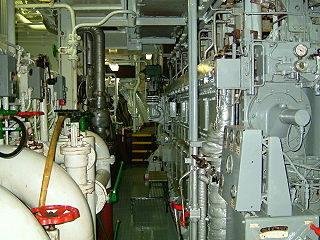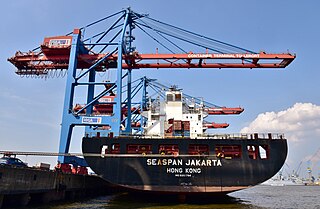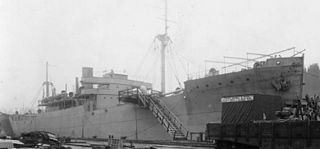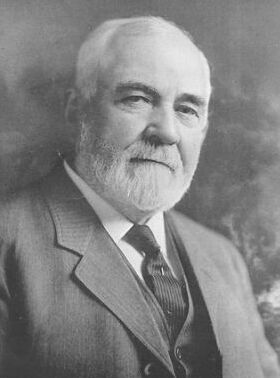
A ship is a large vessel that travels the world's oceans and other navigable waterways, carrying cargo or passengers, or in support of specialized missions, such as defense, research and fishing. Ships are generally distinguished from boats, based on size, shape, load capacity and purpose. Ships have supported exploration, trade, warfare, migration, colonization, and science. Ship transport is responsible for the largest portion of world commerce.

An electric boat is a powered watercraft driven by electric motors, which are powered by either on-board battery packs, solar panels or generators.

Aktien-Gesellschaft "Weser" was one of the major German shipbuilding companies, located at the Weser River in Bremen. Founded in 1872 it was finally closed in 1983. All together, A.G. „Weser" built about 1,400 ships of different types, including many warships. A.G. „Weser" was the leading company in the Deutsche Schiff- und Maschinenbau AG, a cooperation of eight German shipbuilding companies between 1926 and 1945.

On a ship, the engine room (ER) is the compartment where the machinery for marine propulsion is located. The engine room is generally the largest physical compartment of the machinery space. It houses the vessel's prime mover, usually some variations of a heat engine. On some ships, there may be more than one engine room, such as forward and aft, or port or starboard engine rooms, or may be simply numbered. To increase a vessel's safety and chances of surviving damage, the machinery necessary for the ship's operation may be segregated into various spaces.

A merchant ship, merchant vessel, trading vessel, or merchantman is a watercraft that transports cargo or carries passengers for hire. This is in contrast to pleasure craft, which are used for personal recreation, and naval ships, which are used for military purposes.

USS Makin Island (LHD-8), a Wasp-class amphibious assault ship, is the second ship of the United States Navy to be named for Makin Island, target of the Marine Raiders' Makin Island raid early on in the United States' involvement in World War II.

Wärtsilä Oyj Abp, trading internationally as Wärtsilä Corporation, is a Finnish company which manufactures and services power sources and other equipment in the marine and energy markets. The core products of Wärtsilä include technologies for the energy sector, including gas, multi-fuel, liquid fuel and biofuel power plants and energy storage systems; and technologies for the marine sector, including cruise ships, ferries, fishing vessels, merchant ships, navy ships, special vessels, tugs, yachts and offshore vessels. Ship design capabilities include ferries, tugs, and vessels for the fishing, merchant, offshore and special segments. Services offerings include online services, underwater services, turbocharger services, and also services for the marine, energy, and oil and gas markets. At the end of December 2023, the company employed 17,800 workers.

Seaspan ULC provides marine-related services to the Pacific Northwest. Within the Group are three (3) shipyards, an intermodal ferry and car float business, along with a tug and barge transportation company that serves both domestic and international markets. Seaspan, is part of the Washington Companies that are owned by Dennis Washington. Kyle Washington, is the Executive Chairman of Seaspan, who has become a Canadian citizen.
Allied Shipbuilders Ltd is a privately held shipbuilding and ship repairing company established in Canada in 1948.

An inboard motor is a marine propulsion system for boats. As opposed to an outboard motor, where an engine is mounted outside the hull of the craft, an inboard motor is an engine enclosed within the hull of the boat, usually connected to a propulsion screw by a driveshaft.
Vosper & Company, often referred to simply as Vospers, was a British shipbuilding company based in Portsmouth, England.

Marine propulsion is the mechanism or system used to generate thrust to move a watercraft through water. While paddles and sails are still used on some smaller boats, most modern ships are propelled by mechanical systems consisting of an electric motor or internal combustion engine driving a propeller, or less frequently, in pump-jets, an impeller. Marine engineering is the discipline concerned with the engineering design process of marine propulsion systems.

Luna is a historic tugboat normally berthed in Boston Harbor, Massachusetts. Luna was designed in 1930 by John G. Alden and built by M.M. Davis and Bethlehem Steel. She is listed on the National Register of Historic Places and is a U.S. National Historic Landmark. In 1985, the Luna was designated as a Boston Landmark by the Boston Landmarks Commission.

The USCG 65' small harbor tug is a class of fifteen tugs used by the United States Coast Guard for search and rescue, law enforcement, aids-to-navigation work and light icebreaking. The tugs are capable of breaking 18 in (0.46 m) of ice with propulsion ahead and 21 in (0.53 m) of ice backing and ramming. They were designed with steel hulls to replace the 64 ft (20 m) wooden-hulled tugs that had been in service since the 1940s and were built by Gibbs Gas Engine Company, Jacksonville, Florida; Barbour Boat Works of New Bern, North Carolina; and Western Boat Builders Corporation, Tacoma, Washington from 1961 to 1967. They were originally powered by a single 400 horsepower diesel engine, however several have been re-powered with 500 horsepower main drive engines since they were constructed.
Schottel is a manufacturer of propulsion and steering systems for ships and offshore applications. The company founder Josef Becker invented the rudderpropeller, a z-drive, in 1950. Today the company develops and manufactures azimuth propulsion, maneuvering and steering systems. In 2014 the subsidiary Schottel Hydro was founded to bundle up the company activities in the hydrokinetic energy segment.
Sanmar Denizcilik is a Turkish firm that operates its own fleet of tugboats, and builds tugboats for its own fleet, and for other shipping firms. The firm was founded in 1976 by Orhan Gürün and Gökҫen Seven. It remains a privately held firm, with its board of directors chaired by Ali Gürün.

SS Jacona was an Emergency Fleet Corporation Design 1014 cargo ship launched in 1919 for the United States Shipping Board (USSB). In the glut of shipping after World War I, the ship was laid up until selected to be converted into the first specifically designed powership.

The Type V ship is a United States Maritime Commission (MARCOM) designation for World War II tugboats. Type V was used in World War II, Korean War, and the Vietnam War. Type V ships were used to move ships and barges. Type V tugboats were made of either steel or wood hulls. There were four types of tugboats ordered for World War II. The largest type V design was the sea worthy 186-foot (57 m) long steel hull, V4-M-A1. The V4-M-A1 design was used by a number of manufacturers; a total of 49 were built. A smaller steel hull tugboat was the 94-foot (29 m) V2-ME-A1; 26 were built. The largest wooden hull was the 148-foot (45 m) V3-S-AH2, of which 14 were built. The smaller wooden hull was the 58-foot (18 m) V2-M-AL1, which 35 were built. Most V2-M-AL1 tugboats were sent to the United Kingdom for the war efforts under the lend-lease act. The Type V tugs served across the globe during World War II including: Pacific War, European theatre, and in the United States. SS Farallon, and other Type V tugs, were used to help built Normandy ports, including Mulberry harbour, on D-Day, 6 June 1944, and made nine round trips to Normandy to deliver Phoenix breakwaters.

Craig Shipbuilding was a shipbuilding company in Long Beach, California. To support the World War I demand for ships Craig Shipbuilding shipyard switched over to military construction and built: US Navy Submarines and Cargo Ships. Craig Shipbuilding was started in 1906 by John F. Craig. John F. Craig had worked in Toledo, Ohio with his father, John Craig (1838-1934), and Blythe Craig, both shipbuilders, their first ship was built in 1864 at Craig Shipbuilding Toledo. John F. Craig opened his shipbuilding company in Port of Long Beach on the south side of Channel 3, the current location of Pier 41 in the inner harbor, becoming the port's first shipyard. In 1908 Craig Shipbuilding was given the contract to finishing dredging of the Port of Long Beach inner harbor and to dredge the channel connecting it to the Pacific Ocean. In 1917 Craig sold the shipyard to the short-lived California Shipbuilding Company. but then opened a new shipyard next to the one he just sold and called it the Long Beach Shipbuilding Company. The Long Beach Shipbuilding Company built cargo ships in 1918, 1919, and 1920 for the United States Shipping Board.

Agawam was a steam cargo ship built in 1917–1918 by Submarine Boat Company of Newark for the United States Shipping Board (USSB) as part of the wartime shipbuilding program of the Emergency Fleet Corporation (EFC) to restore the nation's Merchant Marine. The vessel was chiefly employed on the East Coast and Mexican Gulf to United Kingdom routes throughout her brief career, and was eventually laid up and scrapped in 1926.















